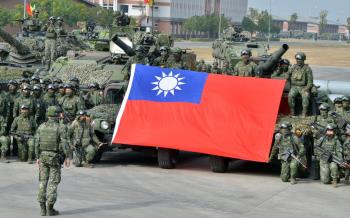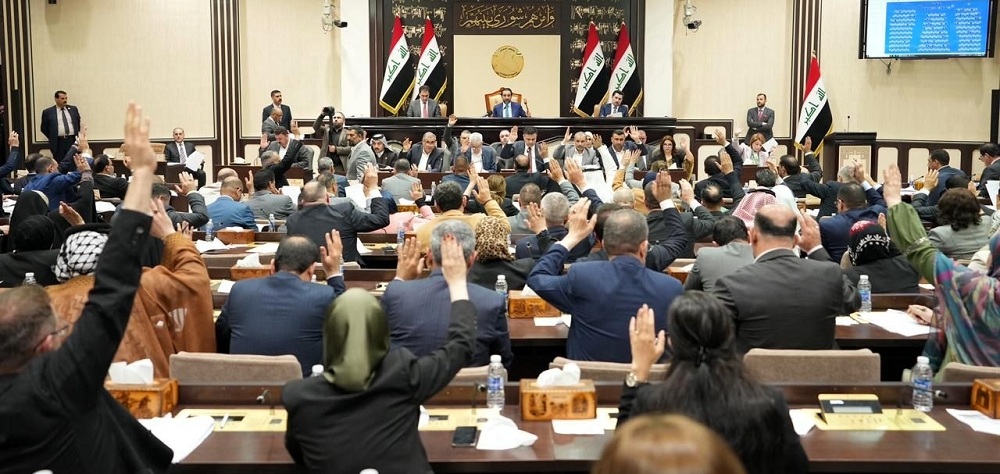Alwaght- While the US uses all of its political, economic, and security levers to entrench itself in Iraq and continue its long-term military presence in the country, Iraqi groups are making steps to eliminate any pretext Washington can use to justify its presence.
Al-Akhbar newspaper has recently reported that after revoking Khor Abdullah Agreement with Kuwait on maritime navigation, the Iraqi parliament last week presented a bill to the Supreme Court asking for review of some of the country’s international agreements including the security pact between Washington and Baghdad. The 2012 agreement with Kuwait was revoked because the Supreme Court decided it was unconstitutional as it was approved by the simple majority vote and not the two-thirds vote of the lawmakers.
Article 61 of the Iraqi Constitution allows for parliamentary appeals in respect of agreements that have been ratified with simple majority, including the security pact with the US. In 2008, Baghdad and Washington signed Strategic Framework Agreement on the regulation of the presence of American forces in Iraqi territory, but on January 5, 2020, after the assassination of prominent anti-terror commanders, Iran’s General Qassem Soleimani and Iraq’s Abu Mahdi Al-Muhandis by the US, the Iraqi parliament voted with a majority to expel the American forces. Washington leaders have not obeyed this law so far, allowing the tensions to run high between the Americans and the resistance forces.
US-Iraq pact terms
The security agreement stressed that the American combat forces will start withdrawing from Iraqi cities and villages in June 2009 and all American forces will withdraw by December 31, 2011, and Iraqi forces will replace them. At that time, the Americans, who had incurred enormous costs for staying in Iraq, inevitably left the country. But not long after, they returned to Iraq under the ruse of fighting terrorism when ISIS terrorist group seized western Iraqi provinces in 2014.
According to Al-Akhbar, the US-Iraq relations are currently characterized by two agreements: The first is Strategic Framework Agreement for a Relationship of Friendship and Cooperation that covers the normalization of relations between the two sides in the economic, diplomatic, and cultural fields. The second is the security pact (SOFA) that defines the framework of security relations between the two countries and the duration of the US presence, activities and final withdrawal from Iraq.
Despite determining the US withdrawal in 2011, the security agreement opened the door for American interference in Iraq’s home affairs, and now and after 14 years, this interference only increased, but the Iraqi leaders are mobilizing their collective efforts to cut off the American interfering hands.
In this regard, Raed al-Maliki, a member of parliament’s Legal Committee in a statement said that the Supreme Court’s ruling about unconstitutionality of the agreement with Kuwait “will open the door for demands to review a number of other agreements.”
It is noteworthy that in 2015, when the Iraqi parliament passed the law regulating the conclusion of treaties, the most important of which was the Strategic Framework Agreement with the US, the MPs tried to cancel this agreement, but according to the new parliamentary regulations about international agreements, this motion failed to get two-thirds majority as article 61 of the constitution requires and so the Supreme Court rejected it.
Nevertheless, the Supreme Court before the 2015 regulation had left a backdoor for new voting. In this connection, al-Maliki said that if the security agreement with the US is challenged in the Supreme Court, it can be discredited by this reasoning. But so far no review bid has been made so far.
The parliament can win again
Although a review request has not yet been made to the Supreme Court, since many political groups have been looking for an excuse to cancel all agreements with the US in the last three years, it seems that now the conditions are provided for them and they can use this opportunity to confront Washington’s destabilizing policies.
“The parliament voted to end the presence of foreign forces, including the American combat forces, in Iraq, but the government of former Iraqi Prime Minister Mustafa al-Kadhimi signed an agreement with Washington so that coalition forces would stay in Iraq for all kinds of advisory and training missions, said member of Defense and Security Commission at Iraqi parliament Hussein al-Ameri, adding that the positions of the lawmakers categorically reject the US presence in Iraq.
“We have many options for supporting decisions in Supreme Court regarding agreements with Washington. Iraq does not need combat forces, and this is what the government has stated more than once, and the pacts should be revised,” he went on.
Having in mind that now the majority is held by the resistance groups and their allies, if the security pact is brought to the parliament, Washington will have a slim chance of the lawmakers voting in favor of the agreement. The Iraqis argue there is no need for foreign military presence on their soil and a majority of people want the Americans out as they find them the main source of crises and insecurity in their country and once the Americans are out, stability will return to the country.
Concerns about political tensions between Iraq and the US
Despite the push by the Iraqi parliamentarians to revoke any agreement with the US, some Iraqis are concerned about consequences.
“If we appeal against international agreements with the Federal Court, it will naturally affect Iraq’s relations with those countries and our credibility in the international community. Canceling the deals and challenging them will bring forth many problems and have great consequences for Iraq. Therefore, we must deal with balance and wisdom in all issues, including international agreements,” said Yakar Mahmoud, a member of Legal Committee.
Nabil al-Marsoumi, a political researcher, warned that if he pact with the US is challenged, Iraqi dinar is expected to severely lose its value against the US dollar.
Kadhim al-Badiri, another analyst, warned about security and political ramifications of tensions with the US. He said that it is difficult to refer to the Supreme Court.
“The nature of relations and positions between Baghdad and Washington are completely different, because there is a positive [American] relationship with the Iraqi Prime Minister Mohammad Shia al-Sudani, and this is what we noticed from al-Sudani’s meetings with the American ambassador in Baghdad, Alina Romanowski. On the other hand, al-Sudani also plans to travel to America in the next few months to sign new deals,” said al-Badiri, concluding that the parliament will not resort to the Supreme Court to appeal against the pact.
Despite warnings by some experts, the majority-holding Shiite Coordination Framework (SCF) can never tolerate the American presence and its top priority is expulsion of the occupying forces. Even one of the conditions for green light to al-Sudani’s premiership was quick conclusion of the US withdrawal, and the PM himself several times made it clear that Iraqi does not need foreign combat forces.
Therefore, if the MPs manage to reactivate the case by referring it to the Supreme Court, the government will be obliged to follow. Still, the concerns of the experts are not unfounded. Experience has shown that when the Iraqis step up pressures on the Americans for withdrawal, the Americans respond with strengthening of terrorist groups and agitating street protests and violence in pursuit of their evil plans, and it is not unlikely that this time even worse scenarios are on the table of the White House officials. However, despite all these speculations, the demand of the Iraqi people for unconditional withdrawal of the Americans is a top priority.



























